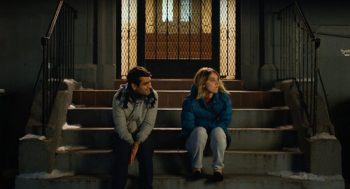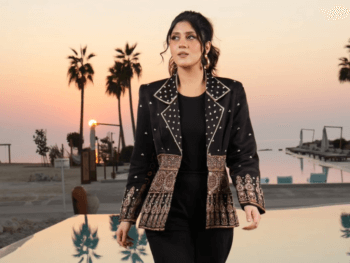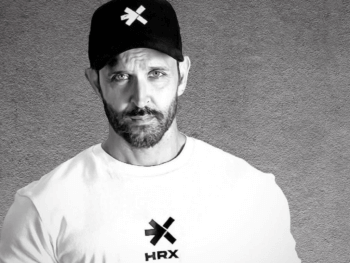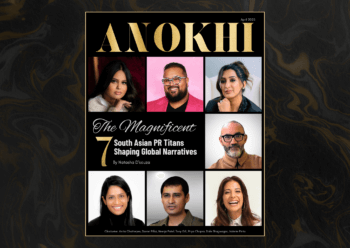
Silicon Valley‘s Kumail Nanjiani gets personal (but still super funny) in The Big Sick, a romantic comedy co-written with his wife about their own unusual road to love.
He’s been a consistent scene-stealer in big-screen comedies like Mike & Dave Need Wedding Dates, and a cornerstone of one of the best comedies on television in HBO’s Silicon Valley, which recently wrapped season four. But now, Kumail Nanjiani is primed to reach a new level, with some even speculating that an Oscar could be in his future.
And he did it by getting downright autobiographical.

The Big Sick, currently in limited release across North America, is a dramedy written by Nanjiani and his wife/podcast co-host Emily V. Gordon, reflecting on a crucial time in their relationship, when he was a struggling young standup comic and she a psychology major who happened to become an unexpected participant/heckler in one of his shows.
In the film, Kumail (playing himself) and Emily (played by Zoe Kazan) meet while he’s on-stage, and tentatively embark on a new romance, which he hides from his devout Muslim parents (Anupam Kher and Zenobi Shroff), who are relentless in setting him up on a cavalcade of family-dinner dates with prospective Pakistani brides.
The culture-clash romance has been done before, and you probably imagine you know where all this is going: your typical boy meets girl, loses girl, wins girl back, stands up to disapproving loved ones. And to an extent, you’d be right. But where The Big Sick manages to make the tropes feel fresh again is in its stranger-than-fiction twist.

More or less mirroring Nanjiani and Gordon’s real-life relationship, right when their bond seems all but broken, Emily is hospitalized with a deadly infection, one that requires doctors to put her in a medically induced coma. Unexpectedly compelled to reevaluate a relationship that had been tanked by unresolved issues with his own family, Kumail suddenly finds himself forging an unlikely bond with Emily’s parents (a never-better Ray Romano and a great-as-ever Holly Hunter), after they rush to their daughter’s bedside.
Produced by Judd Apatow (Knocked Up, The 40 Year Old Virgin) and directed by indie-comedy icon Michael Showalter (Wet Hot American Summer), the film isn’t lacking chuckles. But what stands out here is the novelty. By putting one half of the central will they-won’t they in a coma for the balance of the run time, pairing Kumail up with the parents of his future wife, we feel like we’re experiencing a love story from an entirely different, but still utterly authentic angle. A rare feat in such a well-worn genre.
The film began releasing in select markets in late June and has been slowly expanding across North America, set to realease wide this Friday, July 14. Naturally, the past couple weeks have been busy ones for Kumail Nanjiani, but luckily, right after chatting with NBC’s TODAY show, he was able to squeeze in a little time to fill ANOKHI in on the film that looks primed to change his career.
It all began three years ago, in a pitch meeting with Apatow.

“I had some sort of . . . [chuckles] . . . higher-concept ideas,” Nanjiani recalls. “But there was this story that happened to us that we certainly understand and know and would be an interesting story to tell, so when I met with Judd, I told him this story and he said, ‘OK, let’s start working on it.’”
But just because he and Emily had lived it didn’t make the writing process any less painstaking. Memories needed to be filtered, analyzed and honed into a compelling, meaningful cinematic experience.
“I remembered the past as sort of these BIG, CRAZY THINGS that happened,” Nanjiani explains. “But I hadn’t really gone through and thought about how I felt about it. Writing this movie forced us both to go back and really try to remember everything and how it made me feel and she had to remember how it made her feel and transform it from this dramatic event into something that was more coherent.”
By the same token, just because he’s playing a character named Kumail Nanjiani doesn’t mean he’s playing himself . . . at least, not exactly.

“You know, when you’re in your own life, you don’t really see character arcs for yourself, but in a movie, you have to have arcs for the characters. So to do that, we kind of had to adjust this character of Kumail and his function in the film and the story. So certainly parts of the character were similar to me and it really helped that I had lived through a lot of the film obviously, but in preparation, I approached it like I would approach any other character.”
The same went for finding someone to play his on-screen wife — in a casting process that was a little more complicated than most, given that Najiani and Gordon wrote this very personal screenplay together, but Nanjiani would be acting opposite someone else when the cameras started rolling.
“We had to look at the character of Emily as written, different from Emily as a person . . . and not try and cast someone who would do a good job playing wife, but someone who would do a good job as this character. That said, we auditioned a lot of great people, and Zoe and Emily actually are kind of similar personalities, so it really worked out a lot better than we could’ve hoped for.”
For Nanjiani, an actor accustomed to performing in a purely comedic space, revisiting such a poignant, painful time also presented his first real opportunity to delve into drama. The transition wasn’t without its challenges.

“You know, with comedic scenes, you [can say], ‘Alright, people laughed, that was funny’ or ‘That felt funny, that felt funny.’ With dramatic stuff, you don’t have that. So I kind of had to readjust my own gauge. Comedy acting, I think, is a little more technical, there’s a rhythm to it, there’s a little bit of a math to it. With comedy, you have to get a specific reaction from the audience; with dramatic stuff, you don’t really have that.”
We can assure you: he pulls it off, particularly in a series of endearing exchanges with fellow funnyman-gone-dramatic Romano and the inevitable reckoning with his parents. At least in part because he had plenty of not-entirely-healed emotional wounds to reopen.
“Yeah, it’s emotionally complicated, you know? There’s a lot of stuff I don’t want to relive. For an actor, that’s the best thing you can have, if you are able to act as a character who changes, so from that perspective it’s really, really, exciting and satisfying, but revisiting some of those things from my life was emotionally challenging.”

The gains seem to have been worth the pain. When it debuted this past January at Sundance, The Big Sick was met with ecstatic reviews, which compelled Amazon to shell out a record $12 million for the distribution rights. Still, Nanjiani doesn’t want to get ahead of himself.
“It was surreal; we didn’t know what the reception was going to be like. Also, we were a little concerned because it doesn’t feel like a festival movie, it feels more like a mainstream movie. So we didn’t know what to expect and we were really blown away. But it’s still not out yet; there is buzz, and the reviews have been really good, but nobody knows till it’s out whether people decide to go actually see it.”
Considering The Big Sick subsequently raked in the year’s best per-theatre-gross in limited release, we’re confident in predicting he’ll have himself a hit when the rest of North America gets the chance to see what all the buzz is about this Friday.
Main Image Photo Credit: Courtesy of Lionsgate
Matthew Currie
Author
A long-standing entertainment journalist, Currie is a graduate of the Professional Writing program at Toronto’s York University. He has spent the past number of years working as a freelancer for ANOKHI and for diverse publications such as Sharp, TV Week, CAA’s Westworld and BC Business. Currie ...














































































































